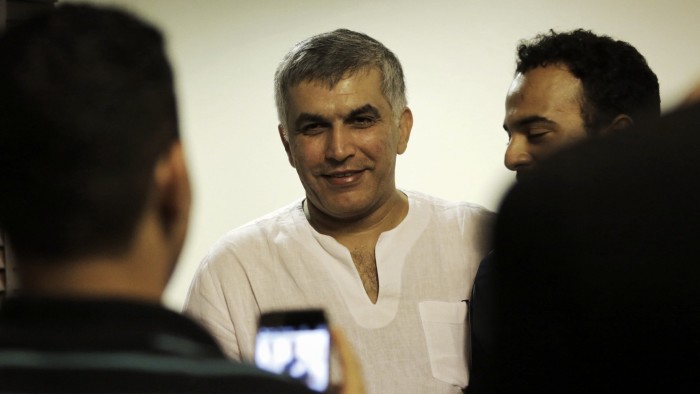Bahrain jails human rights activist over critical tweets

Roula Khalaf, Editor of the FT, selects her favourite stories in this weekly newsletter.
Bahrain sentenced a prominent human rights activist to five years in jail on Wednesday for tweets criticising the war in Yemen, underscoring the narrowing scope for public debate as the Gulf kingdom cracks down on dissent.
The charges against Nabeel Rajab cited laws that prohibit “insulting a neighbouring country” after he used social media in 2015 to condemn the Saudi-led coalition’s bombing campaign against Yemeni rebels. He also accused authorities of abusing inmates at a large jail in Bahrain.
Saudi Arabia, Bahrain’s closest ally, has been widely censured over its air strikes in Yemen targeting Houthi rebels allied to Iran.
Seven years ago, Bahrain was convulsed by pro-democracy protests led by the Shia majority in the tiny state run by the minority Sunni community.
Inspired by revolutions in north Africa, the demonstrations were crushed by security forces after Saudi Arabia, alarmed at the prospect of the Arab uprising contagion bringing down a Gulf monarch, led troops on to the island to back the Al Khalifa ruling family.
Mr Rajab was initially arrested in April 2015, but released on humanitarian grounds three months later. He was detained on a separate charge of spreading rumours in June 2016, for which he was sentenced to another two years in jail.
“This judgment is a prime example of how the Bahraini courts are curtailing freedom of expression by deterring Bahraini citizens from criticising its authorities,” said UK-based advocate Sayed Alwadaei of the Bahrain Institute for Rights and Democracy.
“It seems that the unconditional support from the UK and the US has simply emboldened the Bahraini government to continue its crackdown on civil society,” added Mr Alwadaei.
Before his sentencing, the US, whose Fifth Fleet is based in the capital Manama, said it had “serious concerns” about a Bahraini court upholding the earlier ruling against Mr Rajab for his social media activity.
The government has also closed down political opposition, dissolving the main Shia group al-Wefaq and the leftwing secular Waad movement. The country’s most senior Shia cleric has been stripped of his nationality, too.
Many Sunnis regard activists such as Mr Rajab — who has had several stints in jail on charges linked to protests — as agitators against the government.
Since 2011, unrest has been largely restricted to Shia villages, with a radical fringe adopting violent tactics against security personnel, such as improvised explosive devices.
The government, which has become increasingly aligned with larger neighbour Saudi Arabia, accuses Iran of fomenting dissent among Shia in Bahrain. The opposition denies Iranian backing.
Riyadh, alongside close ally Abu Dhabi, is seeking to challenge Iranian influence elsewhere in the Arab world, such as Syria, Iraq, Lebanon, Qatar and Yemen.
Comments